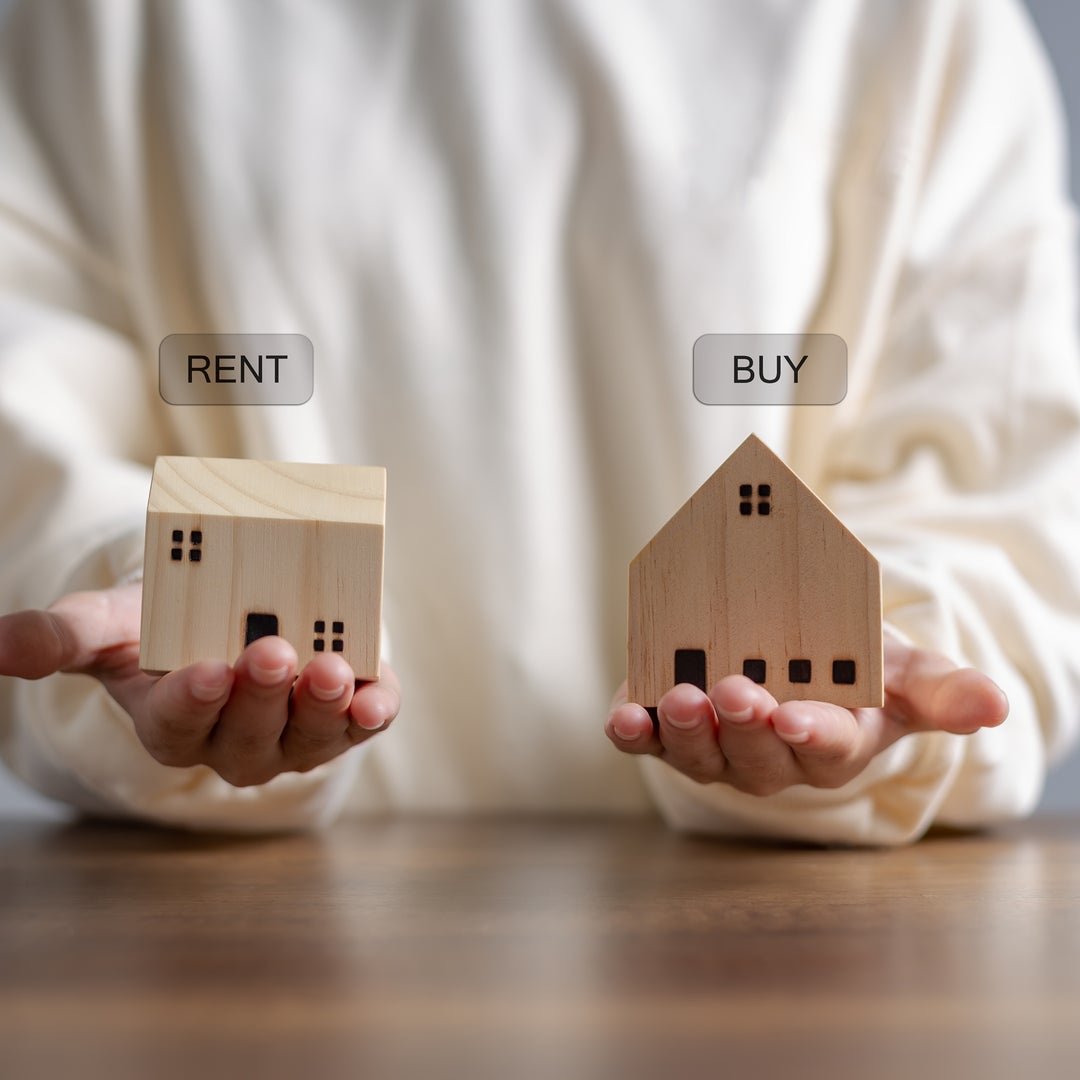Rent vs Buy: The Pros & Cons

A white picket fence. Your own little plot of grass. The ability to paint your walls your favorite shade of lilac. The idea of owning your own home can be appealing, but it’s not always the best decision — especially when you factor in things like repairs, upkeep, and the cost of homeowner insurance. For some people, renting can be a more convenient and affordable option.
So which is best for you: rent vs. buy? To decide which path to take, carefully consider the pros and cons of each option.
Renting
Renting is typically associated with younger adults. In fact, the Pew Research Center reported in 2021 that approximately 66% of adults under the age of 35 rent their homes. However, people of all ages are renters. Sometimes they rent because they can’t afford to buy, but some people choose to rent — even though they could afford to purchase a home — because of the benefits of renting.
When deciding whether it makes sense to rent a home, think about these advantages and drawbacks:
Pros
-
Flexibility: As a renter, you can decide not to renew your lease — or even end it early — when you want to move to another area. That’s not the case when you own a home. Instead, you have to go through the hassle of readying your home for sale, waiting for a buyer, and hoping the deal closes on time. For those who aren’t sure if a particular city or state is right for them or may need to relocate for a job, renting can be a smart idea.
-
Lack of maintenance: If you’re a renter, you don’t have to worry about maintaining the property. If the siding needs to be repaired or the hot water heater has to be replaced, it’s up to your landlord to fix it — not you. That can save you both time and money.
-
No down payment requirements: When you buy a home, you typically need a down payment of 3% to 20% of the home’s value, so you’ll need thousands of dollars on hand. But when you rent, you usually only need the first month’s rent and a security deposit, so there’s a much lower upfront cost.
Cons
-
Little control over the environment: Because you’re renting someone else’s property, you have very limited control over how to use the space. If you want to paint, replace the floors, or plant a garden, you need to get your landlord’s permission.
-
May not be permanent: As a renter, you can typically only live in the unit as long as the landlord allows it. Your landlord can decide not to renew your lease or sell the property, leaving you scrambling to find another place to live.
-
Customer service varies by landlord: When it comes to renting, whether you have a good experience or not can depend on your landlord. Some landlords are quick to respond to maintenance issues and respect your privacy. Others can be less responsive or helpful, and you often won’t know which type of landlord you have until after you sign an agreement and move in.
-
No equity: When you’re a tenant, your monthly rent helps your landlord cover their mortgage payments and other expenses. Your landlord is building equity, but you’re not — the money you spent on rent can’t be recouped, so the long-term cost of renting can be more than you’d expect.
Buying
Owning a home of your own has long been part of the American dream. Buying a house is often viewed as a major life milestone, similar to graduating from school or getting a job.
However, purchasing a house is a significant investment. And the purchase price is only one of the expenses you’ll have to cover, so it’s important to consider all the pros and cons of homeownership before making a decision.
Pros
-
Greater control: As a homeowner, you can customize your space to suit your style and personality. Whether you love wallpaper, bold accent walls, or sleek minimalist styles, owning a home gives you more control over how your home looks.
-
Fewer restrictions on pets: If you own pets, you know how challenging it can be to find pet-friendly landlords. As a homeowner, you usually have fewer restrictions — unless you live in a neighborhood with a strict HOA — on what pets you can keep in your home.
-
Tax benefits: If you itemize your taxes when you file your tax return, you may be eligible for the home mortgage interest deduction if you’re a homeowner. With this deduction, you can deduct all of the interest you paid toward your mortgage during the tax year and reduce your taxable income.
-
Equity: As a homeowner, you can build equity — the value of your house minus what you owe on your mortgage — over time as your home’s value increases and your mortgage balance decreases. You can tap into that equity in the form of loans or lines of credit and, if you sell your house, can profit from the higher value of your home.
Cons
-
Large down payment usually required: When you apply for a mortgage, you usually will need a significant amount of money saved. You’ll need a down payment — usually 3% to 20% of the home value — as well as money to cover closing costs.
-
Responsibility for maintenance and repairs: Unlike renting, where you can call your landlord whenever there’s an issue, you’re solely responsible for your home’s maintenance and repairs. A house can be time-consuming to maintain, and even basic repairs can be expensive.
-
Lack of liquidity: A house is an asset, but it’s not liquid, so you can’t tap into the home’s value without selling it or taking out a loan against your equity. That issue can make it difficult if you need to access cash quickly to cover emergency expenses or take advantage of investment opportunities.
-
Dependency on the housing market: The value of your home is largely dependent on the condition of the housing market. If prices in your area are falling, you may end up owing more on your mortgage than what your home is worth — a situation known as being “underwater” on your mortgage. And if you need to sell your home in a down market, you may have to sell it for less than what you paid for it.
What factors should you consider when deciding whether to rent or buy?
Deciding whether to rent or buy a home is a huge decision. When thinking about your options, consider the following factors:
-
Location: Where you live and how hot the real estate market is there can have a big impact on your decision. In some markets, renting can be more affordable because of skyrocketing home prices, while buying a house may be a better choice in other areas.
-
Finances: Think about the overall state of your finances. To buy a house, you’ll likely need good credit and an established emergency fund. If you have a large amount of debt, such as outstanding student loans or credit card balances, you may struggle to qualify for a mortgage.
-
Costs of a home purchase: Buying a home is a major investment, and it requires a significant amount of cash. In general, you’ll need between 3% and 20% of the home’s value as a down payment, and another 2% to 5% for closing costs.
-
Costs of owning a home: The down payment, closing costs, and monthly payment toward your mortgage aren’t your only expenses. Once you become a homeowner, you need to budget for maintenance costs and repairs. Experts generally recommend setting aside 1% to 4% of the home’s purchase price per year to cover those expenses. You also have to take HOA fees, if applicable, and the interest rate on your mortgage into consideration since they will add to your overall cost. Mortgage rates are higher now than they were even a year ago, so it’s more expensive to buy a home than it used to be.
-
Intangibles: While it’s a good idea to consider all of the numbers, there are some aspects of the rent vs. buy debate that are less objective. Intangible factors to consider are the peace of mind you’d get from owning or renting, the level of flexibility you desire, and whether you need a pet-friendly home. Also think about how long you intend to stay in the area when deciding which living situation is best for you.
Is renting cheaper than owning a home?
Although owning a home is a goal for many people, it’s not always the most financially savvy decision. In some markets, renting can actually be cheaper than owning a house.
According to the Buy vs. Rent Index from researchers at Florida International University, as of March 2022, renting is a better financial decision than buying a home in 17 out of 23 major metropolitan areas. Assuming that the renter uses the money they would have otherwise spent on a home to invest, renting a property in those 17 areas can help them build long-term wealth faster. The only metro areas studied where buying and building equity was better than renting were Boston, Chicago, Cleveland, New York, San Francisco, and Honolulu.
You can use a rent vs. buy calculator to help kick off your research into which option may be a better financial decision in your area.
Is homeownership a good investment?
Historically, home values overall have increased over time. For example, the national median sales price for sold homes was $251,700 as of the end of 2012. As of the end of the first quarter of 2022, the median sales price was $428,700 — a 70% increase. This doesn’t mean there’s a guarantee, though — as with any investment, past results don’t guarantee future performance.
You should also keep in mind that your house isn’t liquid. You can only take advantage of its increased value by selling it or borrowing against your equity.
How many years should you rent before buying becomes the smarter option?
How long you plan to live in one place can affect whether it makes sense to buy or rent a home. When factoring in your closing costs, selling your home a few years after you buy it can result in a financial loss. In general, it takes about four years of living in a home before you break even. The longer you can stay, the longer you have to potentially build more equity.
When it comes to buying vs. renting, there is no one right answer that applies to everyone. The best decision for you depends on your unique circumstances and your own goals. Evaluate the advantages and drawbacks of each option so you can make an informed decision.
If you want to become a homeowner, but saving for a down payment seems impossible, you can use Acorns to start investing money for the future. With Round-Ups, you can save your spare change from every transaction. Over time, those small contributions can add up.
This material has been presented for informational and educational purposes only. The views expressed in the articles above are generalized and may not be appropriate for all investors. The information contained in this article should not be construed as, and may not be used in connection with, an offer to sell, or a solicitation of an offer to buy or hold, an interest in any security or investment product. There is no guarantee that past performance will recur or result in a positive outcome. Carefully consider your financial situation, including investment objective, time horizon, risk tolerance, and fees prior to making any investment decisions. No level of diversification or asset allocation can ensure profits or guarantee against losses. Article contributors are not affiliated with Acorns Advisers, LLC. and do not provide investment advice to Acorns’ clients. Acorns is not engaged in rendering tax, legal or accounting advice. Please consult a qualified professional for this type of service.








